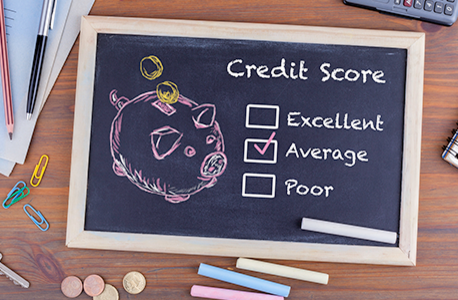Many first-time buyers find the mere thought of applying for a mortgage extremely stressful. One thing people worry about is the credit check part of the mortgage application process as a poor credit score can result in you being declined by a lender. Therefore, it's important to make sure you know what the credit check process is and how it works before applying for a mortgage, especially if you have bad credit or are uncertain about your credit score.
The Topics Covered in this Article Are Listed Below:
- Do Mortgage Lenders Do Credit Checks?
- What Is a Mortgage Credit Check?
- How Do Mortgage Companies Check Your Credit?
- Is a Mortgage Credit Check Different from Looking Up Your Credit Score?
- What Do Credit Checks Show?
- When Do Mortgage Lenders Perform Credit Checks?
- Why Are Mortgage Credit Checks Important?
- Do Mortgage Brokers Need to Do a Credit Check?
- How Will a Mortgage Credit Check Affect My Credit Score?
- Will a Mortgage in Principle Affect My Credit Score?
- Will Multiple Mortgage Applications Affect My Credit Score?
- Can I Get a Mortgage with Bad Credit?
- Getting a Mortgage Without a Credit Score
- Improve Your Credit Score to Get a Mortgage
- Mortgage Credit Checks - Find Out More
Do Mortgage Lenders Do Credit Checks?

Yes, most mortgage lenders do credit checks when assessing whether or not to accept a mortgage application. This means that the lender will look at your financial history to get an overall understanding of how you’ve managed your past finances. This information will then contribute to their decision on whether to lend to you.
Different lenders have different criteria when they do a credit check, so it can be hard to know beforehand whether or not you'll be accepted. This also means it's possible to get a mortgage with a bad credit history if you find the right lender to offer you a specialist mortgage.
While the majority of lenders will use the information held by credit reference agencies to check your credit profile before granting a mortgage, not all lenders operate in the same way. Some specialist adverse credit lenders assess the suitability of borrowers by doing manual underwriting and speaking with the applicant’s mortgage broker to better understand the applicant’s situation. We cover how this works and how to find specialist lenders below.
What Is a Mortgage Credit Check?
A credit check means the lender — whether that's a bank, a building society, or a different type of lender — will look at your financial history. The information they get is gathered from past years, so they'll be able to see lots of detailed information. When mortgage lenders do a credit check for mortgage application purposes, it will either be a soft or hard credit check. Both types of credit check work in the same way and are typically of a similar level of detail but have a different impact on your credit score.
This credit check is a critical step in the mortgage application process and helps lenders decide whether to approve your loan application, as well as what terms and interest rates to offer you based on the level of risk they perceive.
Below you’ll find information about typically happens during a soft and hard UK mortgage credit check.
Soft Credit Check
A soft credit check is designed to give an overview of your credit history. It's where a lender assesses your credit profile but they don’t leave a footprint on it. Only you and the lender would be able to see a soft credit check on your profile. The benefit of not having a footprint left on your credit profile is that it won’t affect your score and other lenders will not be able to see that you’ve had a soft credit check. You wouldn’t be able to get a mortgage with just a soft credit check as all lenders require a hard credit check when you make a full mortgage application. You can usually be offered a mortgage in principle (also known as a Decision in Principle) after a soft credit check. A mortgage in principle shows how much you will be able to borrow and estimates what your mortgage will be like, based on the information you have provided the lender with so far.
Hard Credit Check
Some lenders will run a hard credit check at the Decision in Principle stage. All lenders will run a hard credit check at full mortgage application. The main difference between a hard credit check and soft credit check is that a hard credit check leaves a footprint on your credit profile which any other provider will be able to see and which will affect your credit score. You don’t want too many hard credit checks on your profile as it’s likely to negatively impact your credit score and lenders may wonder why you’ve had so many hard credit checks.
How Do Mortgage Companies Check Your Credit?
Mortgage lenders will do their own credit checks using credit reference agencies and their own private searches. Of course, what each lender looks for in the credit check will be different, as different lenders have varied lending criteria. This makes it hard to know what a mortgage lender will consider when they look at your credit history and whether you'll be accepted. This is why the soft credit check near the start of a mortgage application is so helpful, to both lenders and borrowers.
Is a Mortgage Credit Check Different from Looking Up Your Credit Score?
A mortgage application credit check is different from looking up your own credit score online, although lenders will use a lot of the same information. Nonetheless, this doesn't mean that looking up your own credit score is entirely worthless. It can still be very useful to see the basic information that is available, as this will help you judge what action you take can and your options. If you can see any obvious issues with your credit rating, try to remedy this before applying for a mortgage.
What Do Mortgage Credit Checks Show?

Mortgage credit checks will show a range of information, including:
- Personal details - information including your name, address and date of birth
- Credit list - a list of bank accounts with overdrafts, loans, credit cards and debts
- Payment history - including details of any missed or late payments
- Financial ties- if you have joint credit with a partner or spouse, it will show up here
- CCJs and IVA - County Court Judgements and Individual Voluntary Arrangements from the past 6 years will show up as well
- Previous addresses - including several years of records on where you have lived
- Electoral register details
- Missed payments - further details on missed or incomplete payments and repayments
- Overdrafts - full details of what overdrafts you have
- Fraud issues- whether you have committed fraud or been a victim of fraud
- Bankruptcies- with details from the past 6 years
- House repossessions - that have happened any time in the past 6 years
What Could Affect My Mortgage Application?
There are several negative things on your credit history that could affect your mortgage application. It's hard to know exactly how lenders will react as each lender will have different criteria, but some of the most common issues are:
- No credit history - some lenders might be unwilling to lend to borrowers with no credit history as they could be high risk
- CCJs and IVAs - County Court Judgements and Individual Voluntary Agreements can lead to your application being refused. Lenders will look at how serious the issue is and how long ago it happened
- Late or missed payments - some lenders will accept applications even if you have a late or missed payment in the past, but some lenders will not. It depends on how long ago the issue came up and how many late or missed payments there are
- Bankruptcies and house repossessions - the extent to which this will affect your application will depend on how long you’ve been discharged from bankruptcy and the lender’s criteria
- Defaults - the impact of a default on your application depends largely on the size and how recent it was. Again, if there are settled defaults or they are of low impact, you can probably use a specialist lender to get a mortgage via a broker
When Do Mortgage Lenders Perform Credit Checks?
Most lenders will perform different credit checks at different points of the application process. A lot of lenders will perform a soft credit check at the mortgage in principle stage, but some lenders will do a hard credit check. All lenders will do a hard credit check when you submit your full mortgage application before they send you an offer.
Here’s an overview of when you can expect a mortgage lender to conduct a credit check:
1. Initial Inquiry or Pre-Qualification
When you first inquire about a mortgage or seek pre-qualification, the lender might perform a soft credit check. This type of credit inquiry does not affect your credit score and is typically used to give you an idea of the mortgage amounts and terms you might qualify for based on your credit history.
2. Pre-Approval Stage
During the pre-approval process, which is more formal and serious than pre-qualification, the lender typically conducts a hard credit check. This hard inquiry provides a comprehensive view of your credit history and scores from the credit bureaus. The pre-approval involves a complete application, and this credit check will slightly impact your credit score. Pre-approval is a stronger indication of your ability to secure a mortgage and is often required when you're ready to make offers on homes.
3. Final Approval and Underwriting
Once you make an offer on a home and it's accepted, your mortgage application goes into underwriting. During this stage, the lender might perform another credit check to ensure that there have been no significant changes in your credit status since the initial approval. This is particularly important if there is a lengthy period between your initial pre-approval and the final loan closing.
4. Before Closing
Lenders often conduct a final credit check right before the closing of the loan. This check is to ensure that your financial situation has not changed significantly from the time of your loan approval. Significant changes, such as taking on new debt or missing payments, can lead to a reassessment of your financial status and could potentially derail the closing process.
Why Are Mortgage Credit Checks Important?
These credit checks are crucial for lenders to assess and manage the risk associated with lending large sums of money for home purchases. They want to ensure that borrowers remain creditworthy throughout the loan application process and are likely to be able to meet their mortgage obligations.
Do Mortgage Brokers Need to Do a Credit Check?
Mortgage brokers don’t generally do a credit check on your profile themselves, as this is typically done by the lender.
Your mortgage broker also won’t necessarily need a copy of your credit report, but in some circumstances it can help – e.g. if you have a history of adverse credit and require a subprime lender. The reason for this is because a copy of your credit report can help the broker better match you with a lender.
Can I Get a Mortgage with Bad Credit?

Yes, there are plenty of lenders who offer mortgages to borrowers with bad credit. It can be harder to get a mortgage if you have adverse credit and often you’ll need a broker to help you find a specialist lender.
You may also find that having bad credit means that you will have slightly different criteria regarding the following:
- Deposit- a lot of lenders will require a higher deposit if you have bad credit
- Interest rate - your interest rate could be higher if you have poor credit
How Will a Mortgage Credit Check Affect My Credit Score?
Whether or not a credit check affects your credit score and application depends on what type it is.
Soft credit checks, done before offering a mortgage in principle, will not show up on your credit profile. Only you will be able to see that a soft credit check has been done.
Hard credit checks, on the other hand, do show up on your credit profile. When you go ahead and apply for credit, a hard credit check is carried out. This is so lenders know how much credit you have recently applied for in case this affects your ability to pay back your mortgage. The hard credit check will show up on your credit record whether your application is successful or not.
Your credit record will also show hard credit checks carried out for other financial products, such as credit cards.
Will a Mortgage in Principle Affect My Credit Score?
A mortgage in principle will only affect your credit score if the lender requires a hard credit check at this stage. If they only carry out a soft credit check, your score won’t be impacted.
Will Multiple Mortgage Applications Affect My Credit Score?
If you're applying for multiple mortgages, this will affect your credit score.
Multiple hard credit checks and multiple mortgage applications, in a short period of time, could be considered an issue for some mortgage lenders, especially if they’re on the same property.
It’s worth bearing in mind that if you have multiple properties that you need to remortgage or take out borrowing on within a short time period, this won’t necessarily be an issue for the lender. Having multiple hard credit checks due to mortgaging multiple properties isn’t viewed in the same way as having multiple hard credit checks for one property. In fact, it’s a common occurrence for landlords.
Getting a Mortgage Without a Credit Score
It's possible to get a no credit score mortgage from a specialist lender. These lenders specialise in cases with borrowers who have adverse credit such as defaults and debts. Instead of using the information from credit references to give you a score, they manually underwrite your application to better understand your situation and how the bad credit occurred.
You’ll typically need a mortgage broker if you require an adverse credit lender.
Improving Your Credit Score to Get a Mortgage
If you're struggling to get a mortgage due to poor credit, consider delaying your plans to purchase a property until you've improved your credit score.
The more historic the bad credit event, the less likely it is to impact your application and the more likely you are to be approved for a mortgage.

Mortgage Credit Checks - Find Out More
If you’re concerned about your credit history or want more information about how lenders credit check you, speak to one of our advisers. At John Charcol, we’re experts in helping people with adverse credit find the right deals for their situations. Get in touch today to see how we can help.
First-Time Buyer Mortgages
Discover the best first time buyer mortgage rates available and the latest advice from John Charcol: mortgage broker for first time buyers.
Applying for a Mortgage
Applying for a mortgage couldn’t be simpler with our easy and simple guide from application to accepting your offer.
How Much Can I Borrow?
This mortgage calculator examines your income and works out how much money a mortgage lender might provide you with
House Buying Mortgage Guide
Are you looking to buy your first home? Or perhaps want to move to a new area? Our step-by-step guide will tell you everything you need to know about buying a house.
Help to Buy Guide
Support from the government-backed Help to Buy initiative is available for first-time buyers and existing homeowners who are finding it difficult to move up the housing ladder.
House Mortgage Deposit
Saving a mortgage deposit for a house is definitely one of the biggest hurdles you face as a buyer. In our guide we explain how deposits work and ways you can save.
Mortgage Deposit Amounts
Learn all about the different mortgage deposit amount options, how they affect your mortgage, how they vary depending on what type of borrower you are & more.
Funding Home Improvements
There are a few ways to finance work on a house: get a home improvement loan, remortgage for home improvements, ask your lender for a further advance & more
Mortgage Glossary
On this page you’ll find our detailed mortgage terminology glossary. There’s a lot of jargon out there but we’re here to make it easy.

